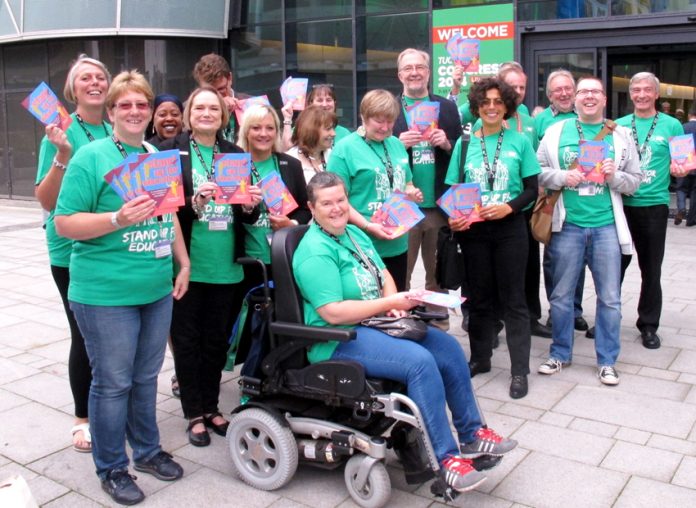
DELEGATES at the TUC Congress yesterday unanimously voted for Composite Motion 7 on Public Sector Pay and Living Standards.
This includes the call on the TUC General Council to ‘draw up a joint industrial action strategy amongst affiliates, co-ordinating strike action amongst affiliates who are in dispute with their employers over the course of the next year’.
It also calls on the General Council to ‘campaign against any proposals to introduce thresholds for union strike ballots’.
The motion was moved by Unison General Secretary Dave Prentis.
He said that with job cuts and insecurity ‘people in work are struggling as never before’. He added: ‘It falls on our generation to lead the fight back.’
He praised the Care UK workers in Doncaster who have been on strike for 50 days. He said: ‘They are striking to stop a vicious, vindictive employer who is cutting their pay by up to 36%.’
He went on to say that 800,000 public sector workers took action on 10th July. He said: ‘This week we are balloting 360,000 health workers.’ He slammed MPs’ 10% pay rise, saying: ‘We will call for coordinated action throughout the rest of this year.’
He concluded: ‘Enough is enough, we’ve been let down by the Tories, we were betrayed by new Labour, we expect our Labour Party to be with us. It’s our time to make a stand.’
Civil servants’ living standards have been slashed by a fifth under this government’s cuts to pay and pensions, the Public and Commercial Services union said.
Taking into account pay cuts, the increase in monthly pension contributions and inflation, by 2015 civil servants will have suffered a real-terms 20% cut in their incomes under this government.
Speaking in the debate yesterday morning, PCS assistant general secretary Chris Baugh said: ‘In the last four years FTSE 100 directors’ pay has increased by 147%. In that same four years, the average value of wages has fallen by 8.5% – costing workers a total of £64 billion a year.
‘Employment in the public sector has grown, but this has mostly been minimum wage, zero-hours contracts and self employment, which have led to low wage growth.
‘We need co-ordinated industrial action across sectors and we need new tactics and targeted action to bring the government to the negotiating table.’
The union’s national executive will hold a special meeting after the conference to decide on whether to join the latest co-ordinated public sector strikes planned for October.
The NASUWT contributed to the debate on public sector pay at the TUC Congress in Liverpool. Chris Keates, NASUWT General Secretary, said: ‘Children and young people are entitled to be taught by those who are recognised and rewarded as highly skilled professionals.
‘The pay freeze and the 1% cost of living award represents deep cuts to teachers’ pay. Young teachers in particular are struggling as, on top of pay cuts and increased pension contributions, they are having to pay back student loans.
‘The assault on pay, combined with the attacks on teachers’ pensions, excessive workload, punitive accountability and job loss are a toxic mix, making teaching increasingly unattractive.’
Graham Dawson, NASUWT Senior Vice President, speaking in the debate, said: ‘NASUWT members have been in continuous action since 2011 to seek to prevent the Coalition Government squandering the legacy they inherited in 2010 when teaching was the top choice for graduates.
‘NASUWT members have taken over 120 days of strike action in individual workplaces in the last year alone. They have defended the teachers’ contract through continuous action short of strike action since 2011.
‘The Secretary of State has been frustrated at every turn by the successful resistance of teachers up and down the country who have been engaged in continuous action, action short of strike action, and strike action where necessary, to hold the line on the teachers’ contracts and demonstrating the need for ensuring that teachers are focused on the teaching and learning of their pupils.’
Conference went on to vote unanimously for Motion 25 from the BFAWU Bakers Union, calling for a campaign for a £10 Minimum Wage. Delegates also voted unanimously for Composite 8 Pensions, moved by FBU General Secretary Matt Wrack.
He said firefighters are continuing their fight to defend their pensions. He declared: ‘Firefighters are not prepared to see their pensions stolen off them by this government or anyone else.’
Later, PCS delegate Helen Flanagan made a statement calling for a reference back on paragraph 1.15 of the TUC General Council Report.
She said: ‘On 1st August the TUC published a joint statement with the Prince’s Trust on Work Experience and a joint statement with the CBI on traineeships, both of which apply to 18-to 24-year-olds.
‘Both statements tacitly accept that either placement could be unpaid for up to eight weeks whilst the individual stays on their benefit. The CAB (Citizens Advice Bureau) describe both as “work for your benefit schemes”.’
Flanagan went on to point out that previous Congresses had voted against such schemes and said: ‘We believe the TUC should withdraw from these disgraceful statements.’
For the General Council, Kay Carberry said: ‘The TUC has made clear its opposition to any form of workfare and we’ll invite the PCS to talk to the TUC General Council and Youth Forum over this.’